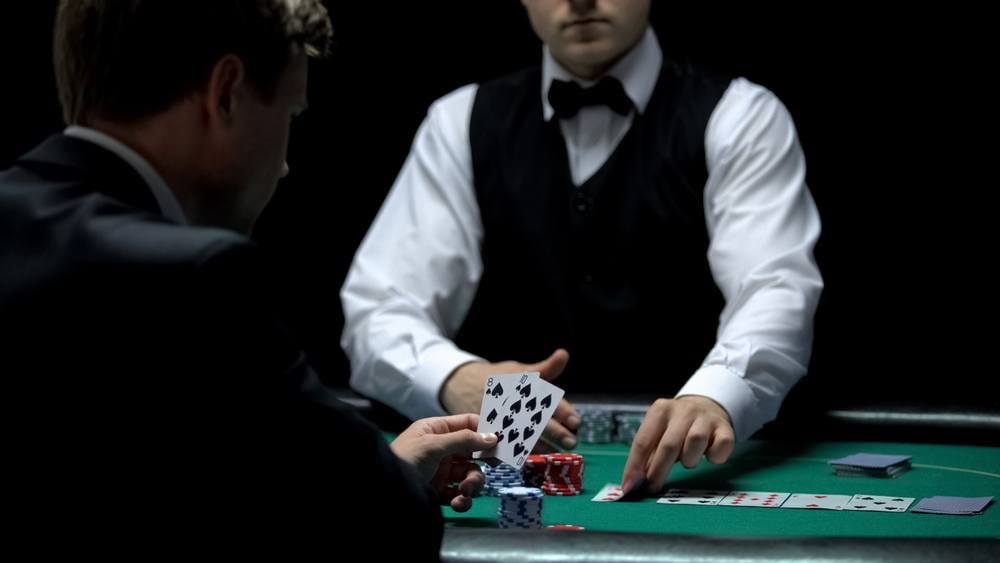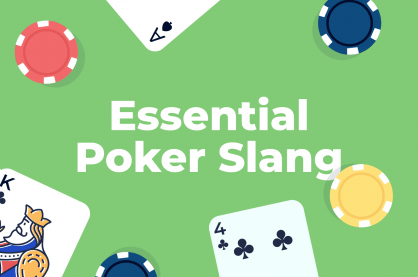5 Mindset Shifts Every Beginner Poker Player Needs to Succeed

Cultivating an Effective Poker Player Mindset: What You Need to Know
- Embrace Failure as a Learning Tool: Understand that missteps in poker, especially for a beginner poker player, are valuable learning opportunities, not just failures. By assessing what went wrong, you can use this information to refine strategies and improve decisions in future games.
- Patience Is Key: Recognize the importance of playing perceptively and patiently. Successful poker is never rushed – hence, the need to evaluate every situation carefully before making a move.
- Emphasize Skill Over Luck: Shift the mindset from believing poker to be purely a game of luck to understanding it as a game of skill as well. The most successful players heavily invest in enhancing their poker skills.
- Develop Healthy Risk-Tolerance: Cultivate a balanced approach to taking risks. The ability to evaluate chances and take calculated risks is crucial in poker, while reckless decisions often lead to losses.
- Maintain Emotional Control: Master the art of controlling emotions during the game. Poker can put stress on players’ emotions, but it’s essential not to let these emotions cloud judgement, thus improving decision-making under pressure.
Every online poker player wants to become a consistent winner, but the journey can feel like a rollercoaster for beginners. One day, you’re riding high after a big win; the next, you question whether you’re cut out for the game after a crushing loss. Success in poker isn’t just about mastering strategy. It’s about having the right mindset to navigate the challenges and uncertainties of the game.
Developing a winning mindset is as important for a beginner poker player as learning proper poker strategy. Without it, even the best strategies can crumble under pressure. Poker is a game where your mental approach determines how well you handle setbacks, make decisions, and grow as a player.
In this article, I’ll share five essential mindset shifts that every beginner needs to embrace to succeed. These shifts will help you focus on what truly matters, overcome the frustrations of mistakes, and set yourself up for long-term success.

Image credit: Dmitry Morgan/Shutterstock
Mindset Shift #1: Focus on Process Over Outcomes
One of the most common mistakes a beginner poker player make is being results-oriented. Winning a hand feels terrific, while losing can hurt deeply—but here’s the catch: poker is a game of long-term decision-making, not short-term outcomes. To succeed, you must shift your focus from what you can’t control (the cards and immediate results) to what you can control (the quality of your decisions).
Why It Matters
Even a perfect play can lose, while a poor play might occasionally win. This is variance, and it can make short-term results misleading. When you fixate on outcomes, you’re more likely to fall into emotional traps like chasing losses or playing recklessly after a big win. Over time, this mindset creates inconsistency and frustration, eroding the confidence you need to grow as a player.
Focusing on the process of making sound decisions based on the information available builds the habits and skills that lead to sustained success. Winning sessions become a byproduct of solid decision-making rather than luck.
Key Insight
The goal of poker is to consistently make decisions that yield positive expected value (EV) over the long run. Embracing this mindset lets you stay calm and objective, even during losing streaks, because you know you’re playing the game correctly.
Actionable Tip
Start tracking your decision-making instead of your results. After each session, take a few minutes to reflect by answering these questions:
- Did I play according to my strategy or deviate out of frustration or overconfidence?
- Were my decisions based on solid reasoning and the available data (e.g., opponent tendencies, position, stack sizes)?
- What could I improve next time?
Consider keeping a poker journal to log your reflections. Over time, you’ll notice patterns and gain confidence in your process.

Image credit: Motortion Films/Shutterstock
Mindset Shift #2: Embrace Variance as Part of the Game
When you first start playing poker, it’s easy to believe that winning consistently is simply a matter of learning the right strategies. While skill is a critical component of success, there’s another force you must come to terms with: poker variance.
Even the best players in the world lose hands (and even entire sessions) due to bad luck. To succeed at poker, you must embrace variance as an integral part of the game rather than a personal attack.
Why It Matters
Variance is poker’s natural ebb and flow—the unavoidable ups and downs of a game involving skill and chance. Beginners often struggle to accept this reality, leading to frustration, self-doubt, and emotional reactions (hello, tilt!). When you interpret bad beats or downswings as a reflection of your skill, it can derail your focus and prevent you from making the best decisions.
Shifting your mindset to accept variance will help you stay grounded and emotionally steady. It reminds you that your job as a player isn’t to avoid variance but to manage it effectively. Staying focused on making good decisions will help you maintain confidence, even through rough patches.
Key Insight
Variance doesn’t discriminate. Everyone experiences it, and it’s not something you can out-strategize. What separates great players from everyone else is how they handle it. Instead of fearing variance, use it as an opportunity to practice resilience and mental toughness, two skills that are just as important as knowing when to fold or raise.
Actionable Tip
Develop a ritual to calm yourself after a bad beat. For example, try the 6-2-7 breathing technique:
- Breathe in through your nose for a count of 6.
- Hold your breath for a count of 2.
- Exhale slowly through your mouth for a count of 7.
This quick exercise helps calm your nervous system, clears your head, and allows you to reset before the next hand. You can use it anytime to manage emotional spikes caused by variance.

Image Credit: Kitreel/Shutterstock
Mindset Shift #3: Adopt a Growth Mindset
As a beginner, it’s easy to fall into the trap of believing poker is about natural talent or luck. You might look at experienced players and think, “I’ll never be that good,” or get frustrated when you make a mistake.
But the truth is, poker is a skill, and you can improve it with time, effort, and the right mindset. To succeed, you need to adopt a growth mindset: the belief that your abilities aren’t fixed and that every mistake is an opportunity to learn and improve.
Why It Matters
Poker is a complex game that constantly challenges you to think critically, adapt, and refine your strategies. A growth mindset is essential for navigating the inevitable setbacks of learning new poker tips and tricks. Without it, you risk getting stuck in frustration instead of working to identify areas to improve.
With a growth mindset, mistakes and losses become valuable feedback instead of personal failures. This perspective makes poker more enjoyable and accelerates your development as a player. When you embrace the idea that improvement is always possible, even small steps forward can compound into significant gains over time.
Key Insight
You don’t have to be perfect to be successful at poker; you just have to keep improving. Mistakes are a natural part of the process, and the sooner you start seeing them as stepping stones instead of roadblocks, the faster you’ll progress.
Actionable Tip
Create a post-session review habit. After every session, ask yourself these three questions:
- What’s one thing I did well today?
- What’s one mistake I made, and what can I learn from it?
- What’s one action I can take to improve next time?
By consistently reflecting on your performance, you’ll see patterns and clarify what’s working and needs adjustment. This will keep you focused on growth rather than perfection.
Reframing Poker as a Learning Journey
Poker isn’t a game you master overnight; it rewards those willing to do the work and stay curious. Adopting a growth mindset will improve your skills and cultivate resilience and confidence. Remember, every great poker player started as a beginner. The difference is they didn’t let mistakes define them—they let mistakes refine them.

Image Credit: Your Hand Please/Shutterstock
Mindset Shift #4: Cultivate Discipline and Patience
Poker is a game of timing and self-control. As a beginner poker player, you might want to play every hand, chase every loss, or push for action to avoid boredom. But the truth is that the players who succeed are the ones who can sit back, observe, and wait for the right opportunities. Cultivating discipline and patience is non-negotiable if you want to build a solid foundation for long-term poker success.
Why It Matters
Discipline and patience separate impulsive players from strategic ones. Beginners often fall into traps like playing too many hands or deviating from their strategy after a few bad beats. These habits drain their bankroll and confidence.
You’re positioning yourself to make better decisions when you develop the discipline to stick to your plan and the patience to wait for the right spots. In poker, small edges compound over time, and disciplined players are the ones who reap the rewards.
Key Insight
Poker isn’t about constant action—it’s about calculated action. Sometimes, the best move is to fold and wait, even when it feels boring or frustrating. Learning to enjoy the process of observation and decision-making rather than seeking immediate gratification, will set you apart from most beginner players.
Actionable Tip
Create a pre-session plan to guide your decisions before you sit down to play. This plan might include:
- A clear set of starting hand ranges for each position.
- A stop-loss for how much you’re willing to lose in a single session.
- A rule for how you’ll handle bad beats (e.g., taking a short break or practicing the 6-2-7 breathing technique).
Establishing these guidelines in advance can keep you from making emotional or impulsive decisions during the session.
Reframing Patience as a Skill
Patience is an active skill that requires focus and practice. Instead of seeing long periods without action as wasted time, use them to study your opponents’ tendencies, refine your reads, or simply remind yourself that poker is a game of waiting for the right moments.
By cultivating discipline and patience, you’ll improve your results and develop the mental toughness to stay composed and consistent. And in poker, consistency is the ultimate edge.

Image credit: Kiselev Andrey Valerevich/Shutterstock
Mindset Shift #5: Develop Emotional Resilience
Poker is a game of highs and lows. If you’re not prepared for that, it’s easy to let frustration, anger, or disappointment take over. Emotional resilience is the skill that keeps you grounded, focused, and performing at your best, no matter what the cards throw your way.
Why It Matters
Tilt, the emotional state where frustration clouds your judgment, is one of the biggest threats to any player’s success. Beginners are especially vulnerable because they often take losses personally or feel the need to “get even.” But poker doesn’t owe you anything, and chasing losses usually leads to even bigger mistakes.
Emotional resilience helps you bounce back quickly from setbacks, stay calm under pressure, and focus on making good decisions. Resilient poker players don’t let one bad beat ruin their session—or their confidence.
Key Insight
You can’t control the cards, but you can control how you respond to them. Emotional resilience is about staying steady and composed, regardless of whether you’re on a heater or a downswing. The better you manage your emotions, the more consistent your game will become.
Actionable Tip
Practice self-talk to reframe setbacks in a way that keeps you focused and confident. When you think something like, “I always lose with aces,” replace it with a more constructive thought like, “Variance is part of the game, and I made the right decision based on the information I had.”
Over time, this habit trains your brain to respond to challenges with logic instead of emotion. To regain your composure, pair this with a simple reset ritual, like stepping away from the table for a few minutes or doing a quick breathing exercise.
The Resilience Advantage
Emotional resilience doesn’t mean you’ll never feel frustrated. Instead, it’s about how quickly you recover when emotions do surface. The more you practice, the more natural it becomes to let go of the things you can’t control and stay focused on making good decisions.
By strengthening your emotional resilience, you’ll become a better poker player and enjoy the game more. After all, poker is meant to be challenging—and rising to those challenges is what makes the journey so rewarding.
Creating the Right Poker Player Mindset
Success in poker isn’t just about knowing the right strategies or studying for hours. It’s about cultivating the mindset that allows you to perform consistently, learn from mistakes, and handle the ups and downs of the game. The five mindset shifts I’ve covered—focusing on the process, embracing variance, adopting a growth mindset, cultivating discipline and patience, and developing emotional resilience—are the foundation for long-term success.
If you’re just starting, don’t feel like you need to master all of these shifts at once. Instead, choose one to focus on this week. Start small—track your decision-making after each session, or take a moment to breathe deeply after a tough beat. These small actions add up; they’ll transform how you approach the game over time.
Title Image Credit: Kiselev Andrey Valerevich/Shutterstock


